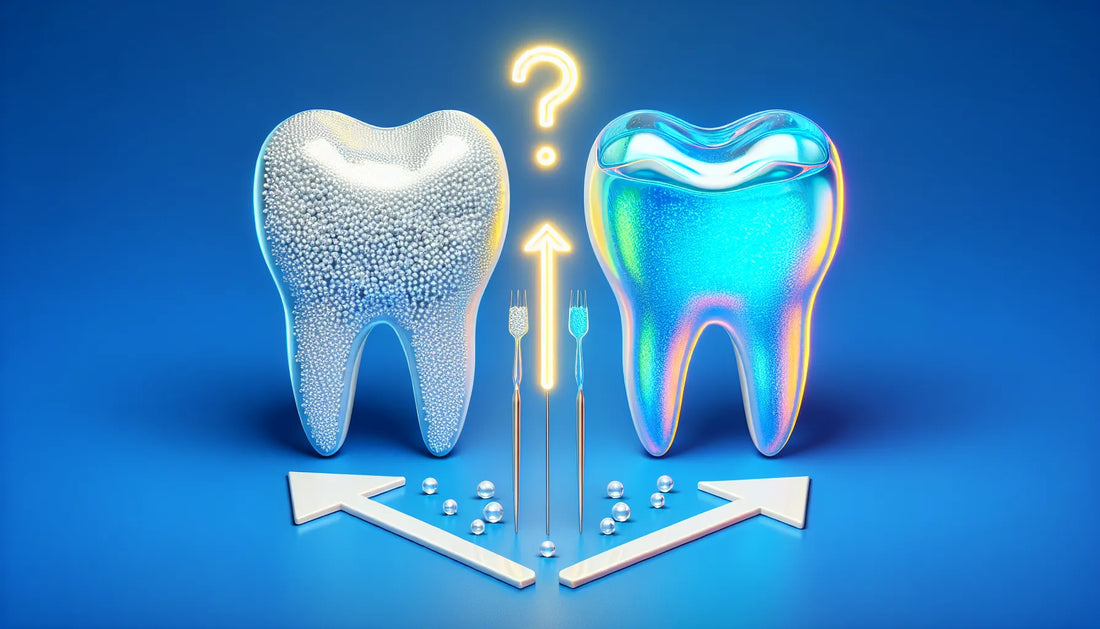Nano-Hydroxyapatite vs. Fluoride
In the realm of dental care, the debate between Nano-Hydroxyapatite and Fluoride for superior cavity protection has sparked significant interest. As individuals seek the most effective means to maintain optimal oral health, the comparison between these two substances becomes increasingly pertinent. Nano-Hydroxyapatite, a synthetic form of the mineral that naturally occurs in teeth and bones, has emerged as a promising alternative to traditional fluoride-based treatments. Its ability to remineralize tooth enamel and potentially reverse early-stage cavities has garnered attention from both dental professionals and consumers. On the other hand, fluoride, a long-established stalwart in dental care, has a proven track record in preventing tooth decay and strengthening enamel. This ongoing discourse has led to a growing need for a comprehensive understanding of the benefits and drawbacks of each option. By delving into the scientific evidence and practical implications, we can discern which substance ultimately reigns supreme in the realm of cavity protection.
What is Nano-Hydroxyapatite?
Nano-Hydroxyapatite is a key ingredient in natural oral care products, such as ToothPow toothpaste. In this section, we will explore the definition and composition of Nano-Hydroxyapatite, as well as how it works and the benefits of using it.
Definition and Composition
Nano-Hydroxyapatite is a naturally occurring mineral form of calcium apatite that is similar to the mineral composition of our teeth. It is made up of calcium, phosphorus, and oxygen atoms, which form a crystalline structure. The "nano" in Nano-Hydroxyapatite refers to the extremely small particle size of the mineral, which allows it to penetrate the enamel and effectively interact with the tooth surface.
How Nano-Hydroxyapatite Toothpaste Works
Nano-Hydroxyapatite toothpaste works by remineralizing the teeth and reducing tooth sensitivity. When applied to the teeth, the Nano-Hydroxyapatite particles bond with the enamel, filling in microscopic defects and repairing damaged areas. This remineralization process helps to strengthen the teeth, making them more resistant to tooth decay and erosion.
Benefits of Using Nano-Hydroxyapatite Toothpaste
There are several benefits to using Nano-Hydroxyapatite toothpaste, which make it an ideal choice for natural oral care:
Remineralization of Teeth: Nano-Hydroxyapatite toothpaste promotes the remineralization of teeth, helping to restore the mineral content of the enamel. This helps to repair and strengthen the teeth, reducing the risk of cavities and tooth decay.
Reduction of Tooth Sensitivity: Many individuals experience tooth sensitivity, which can be caused by exposed dentin or worn enamel. Nano-Hydroxyapatite toothpaste helps to reduce tooth sensitivity by repairing the enamel and protecting the dentin, providing relief from discomfort.
Non-Toxic Nature: Nano-Hydroxyapatite is a safe and non-toxic alternative to traditional toothpaste ingredients, such as fluoride. It is biocompatible with the human body and does not have any known adverse effects.
Suitable for All Ages: Nano-Hydroxyapatite toothpaste is suitable for individuals of all ages, including children and those with sensitive teeth. Its gentle yet effective formula makes it a versatile option for the whole family.
-
Whitening Effect and Stain Resistance: Nano-Hydroxyapatite has a natural whitening effect on the teeth, helping to remove surface stains and restore their natural brightness. Additionally, its protective properties make the teeth more resistant to future staining.

What is Fluoride?
Fluoride is a mineral that is commonly found in nature. It is also added to many oral care products, including toothpaste. In this section, we will explore the definition and composition of fluoride, how fluoride toothpaste works, and the benefits of using fluoride toothpaste.
Definition and Composition
Fluoride is a chemical compound that consists of the element fluorine. It is found in various forms, such as sodium fluoride, stannous fluoride, and sodium monofluorophosphate. These compounds are added to toothpaste to help prevent tooth decay and strengthen tooth enamel.
How Fluoride Toothpaste Works
Fluoride toothpaste works by interacting with the minerals in your teeth. When you brush your teeth with fluoride toothpaste, the fluoride ions in the toothpaste react with the minerals in your teeth, forming a protective layer. This layer helps to prevent cavities by making your tooth enamel more resistant to acid attacks from plaque bacteria and sugars.
Benefits of Using Fluoride Toothpaste
Using fluoride toothpaste offers several benefits for your oral health. Let's explore some of the key benefits:
Prevention of Cavities : One of the primary benefits of using fluoride toothpaste is its ability to prevent cavities. The protective layer formed by fluoride helps to strengthen tooth enamel and make it more resistant to decay. By using fluoride toothpaste regularly, you can reduce your risk of developing cavities.
Strengthening of Tooth Enamel : Fluoride toothpaste helps to strengthen tooth enamel, which is the outer layer of your teeth. Stronger enamel is less likely to erode or break down, leading to fewer dental issues in the long run. Regular use of fluoride toothpaste can help maintain the integrity of your tooth enamel.
-
Widely Recommended by Dentists : Fluoride toothpaste is widely recommended by dentists and oral health professionals. Its effectiveness in preventing cavities and strengthening tooth enamel has been well-documented. Dentists often advise their patients to use fluoride toothpaste as part of their daily oral care routine.

Comparison between Nano-Hydroxyapatite and Fluoride
Nano-Hydroxyapatite and fluoride are both commonly used in oral care products for their cavity protection properties. However, there are notable differences between these two ingredients. In this section, we will compare the composition and mode of action, efficacy in cavity protection, safety considerations, and common benefits and differences of nano-hydroxyapatite and fluoride.
Composition and Mode of Action
Nano-hydroxyapatite is a natural mineral compound that makes up the majority of our tooth enamel and dentin. It is biocompatible and has a similar chemical structure to the minerals found in our teeth. When applied to the teeth, nano-hydroxyapatite can help repair and remineralize enamel, making it stronger and more resistant to cavities.
On the other hand, fluoride is a chemical compound that is commonly added to toothpaste and water supplies for its cavity-fighting abilities. It works by strengthening the enamel and making it more resistant to acid attacks from bacteria in the mouth. Fluoride also has the ability to reverse early signs of tooth decay.
Efficacy in Cavity Protection
Both nano-hydroxyapatite and fluoride have been shown to be effective in cavity protection. Several studies have demonstrated the ability of nano-hydroxyapatite to remineralize enamel and reduce the risk of cavities. It has also been found to be effective in treating tooth sensitivity.
Fluoride, on the other hand, has been widely used for decades and has a long history of proven efficacy in cavity prevention. It is recognized by dental professionals as a highly effective ingredient for reducing the risk of tooth decay.
Safety Considerations
Nano-hydroxyapatite is a naturally occurring substance and is considered safe for use in oral care products. It is non-toxic and does not have any known adverse effects. However, as with any oral care product, it is important to follow the recommended usage instructions.
Fluoride is generally safe when used in the recommended amounts. However, excessive intake of fluoride can lead to dental fluorosis, a condition that affects the appearance of the teeth. It is important to use fluoride products as directed and to monitor fluoride intake, especially in young children who may be more susceptible to fluorosis. There are also a lot of other theories that show Fluoride may even calcify your pineal gland and has shown in some studies lower IQ due to fluoride consumption. When there are natural options available to protect teeth why take the chance?
Common Benefits and Differences
Both nano-hydroxyapatite and fluoride offer benefits in cavity protection. They can both help strengthen enamel and reduce the risk of tooth decay. However, there are some key differences between these two ingredients.
Nano-hydroxyapatite is a natural alternative to fluoride and is well-suited for those who prefer natural oral care products. It is also effective in treating tooth sensitivity and can help repair early signs of tooth decay.
Fluoride, on the other hand, has a long history of proven efficacy and is widely recommended by dental professionals. It is especially beneficial for those at higher risk of cavities, such as children and individuals with poor oral hygiene habits.

Which Offers Better Cavity Protection?
When it comes to choosing a toothpaste, one of the most important factors to consider is its effectiveness in cavity protection. In this section, we will evaluate the effectiveness of both natural and conventional toothpaste based on scientific research, as well as consider individual needs and preferences. It is important to note that consulting a dentist for personalized advice is crucial in making the right choice.
Evaluation of Effectiveness Based on Scientific Research
Scientific research plays a vital role in determining the effectiveness of toothpaste in cavity protection. Numerous studies have been conducted comparing natural and conventional toothpaste in this regard. While both types of toothpaste have been found to be effective, there are some differences worth noting.
Natural Toothpaste : Natural toothpaste, such as ToothPow, contains ingredients derived from nature, such as herbal extracts and essential oils. These ingredients have been shown to have antimicrobial properties, which can help prevent the growth of harmful bacteria that cause cavities. Additionally, natural toothpaste often does not contain artificial sweeteners or preservatives, which can be beneficial for oral health.
Conventional Toothpaste : On the other hand, conventional toothpaste typically contains fluoride, a mineral that has been proven to strengthen tooth enamel and prevent tooth decay. Fluoride is widely recommended by dentists and is considered to be one of the most effective cavity-fighting ingredients.
Consideration of Individual Needs and Preferences
While scientific research provides valuable insights, it is also important to consider individual needs and preferences when choosing a toothpaste. Some individuals may have specific dental conditions, such as sensitivity or gum disease, which may require specialized toothpaste. In such cases, consulting a dentist is essential to determine the most suitable option.
Furthermore, personal preferences, such as taste and texture, can influence the choice of toothpaste. Natural toothpaste often offers a variety of flavors derived from natural sources, appealing to those who prefer a more organic and refreshing experience. Conventional toothpaste, on the other hand, may provide a wider range of options, including those specifically designed for sensitive teeth or whitening purposes.
Importance of Consulting a Dentist for Personalized Advice
While this section provides an overview of the effectiveness and considerations for choosing a toothpaste, it is important to emphasize the significance of consulting a dentist for personalized advice. Dentists are oral health experts who can assess individual needs, recommend the most suitable toothpaste, and provide guidance on proper oral care routines.

Tips for Good Oral Hygiene
Maintaining good oral hygiene is essential for healthy teeth and gums. Here are some tips to help you achieve optimal oral health:
Brushing with Nano-Hydroxyapatite toothpaste: Using a toothpaste that contains Nano-Hydroxyapatite can be beneficial for your oral health. This natural ingredient helps to remineralize and strengthen tooth enamel, reducing the risk of cavities and tooth decay. Make sure to brush your teeth at least twice a day, for two minutes each time, using gentle circular motions.
Using expandable floss regularly: Flossing is an important part of oral hygiene as it helps to remove food particles and plaque from between your teeth and along the gumline. Consider using expandable floss, which expands to fit the spaces between your teeth, providing a more thorough clean. Aim to floss at least once a day, being careful to reach all areas of your mouth.
Limiting acidic foods in the diet: Acidic foods and drinks can erode tooth enamel over time, leading to tooth sensitivity and increased risk of cavities. To protect your teeth, try to limit your intake of acidic foods such as citrus fruits, carbonated drinks, and vinegar-based dressings. If you do consume acidic foods or drinks, rinse your mouth with water afterwards to help neutralize the acid.
Using alcohol-free mouthwash: Mouthwash can be a useful addition to your oral hygiene routine, as it can help to kill bacteria and freshen your breath. Opt for an alcohol-free mouthwash to avoid drying out your mouth, which can contribute to bad breath and other oral health issues. Swish the mouthwash around your mouth for about 30 seconds after brushing and flossing.
By following these tips for good oral hygiene, you can maintain a healthy smile and prevent common dental problems. Remember to visit your dentist regularly for check-ups and professional cleanings to ensure optimal oral health.
At ToothPow, we are committed to providing natural oral care products that promote good oral hygiene and overall well-being. Our Nano-Hydroxyapatite toothpaste, expandable floss, and alcohol-free mouthwash are designed to support your oral health journey. Discover the power of natural ingredients and take control of your oral care routine with ToothPow.

Conclusion
In conclusion, the debate between nano-hydroxyapatite and fluoride for cavity protection continues to be a topic of interest in the dental community. Both substances have their own set of benefits and drawbacks, and the choice between the two ultimately depends on individual needs and preferences. It's important to consult with a dental professional to determine the best option for maintaining oral health. If you're interested in exploring dental care products further, you can visit ToothPow for updates on their upcoming store launch and to stay informed about the latest developments in oral care.

